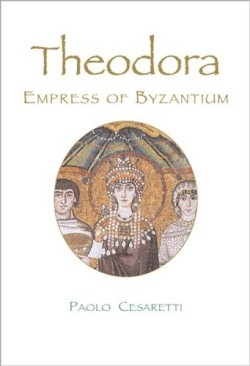Theodora
Empress of Byzantium
Was Theodora a ruthless Byzantine empress who plotted and schemed her way onto the throne? Or antiquity’s own feminist who merits a place in the annals of history’s extraordinary women?
The author brings to life a female legend upon whom history has heaped much speculation. His study examines her remarkable ascent from lowly bear keeper’s daughter to celebrated mime actress and courtesan, which provided her entrance into the upper echelons of Constantinople’s society, from where she rose to become Augusta to Emperor Justinian.
Cesaretti, internationally recognized authority in Byzantine studies, uses original sources, including the writings of Procopius, who served under Theodora’s rule. Procopius’s highly critical and acerbic account of the imperial couple’s reign, The Secret History, is still “the best tool for researching the life of Theodora” despite its personal bias.
The daunting task of discovering the real Theodora is made even more complex by seemingly irreconcilable sources. Procopius’s
description of Theodora as promiscuous and power-crazy contradicts the writings of Monophysite authors of the time, who celebrated her as “pious” and “saintly.” The author provides a deeper level of analysis in which he suggests a number of possible accounts.
The “pious” Theodora may originate from her active allegiance to Monophysitism-the belief in Jesus Christ’s solely divine nature-and demonstrates her close link to the history of Christianity.
The cunning Theodora is described when Justinian falls “sick with love-mad for love.” She is accused of using “new devices of intercourse” and “witchcraft” to win his heart. Her reputation as a cruel ruler is confirmed at least once in the case of Basianus who “insulted her in Constantinople so without trial Theodora ordered him castrated, and he died as a result.”
The fatherless girl followed her mother’s example of female strength and courage, learning “self-defense” out of necessity and “using all possible tools in the most adverse situations.” Theodora worked towards women’s rights by legally banishing “pleasure houses” and forbidding pimping. She strengthened women’s position in society “within the context of the mononuclear family … the blueprint for Christian society,” though modern feminists would later aim to liberate women from that very same nucleus.
Cesaretti asks how Theodora could accomplish her remarkable transition from lowly birth to Emperor Justinian’s Augusta. “The answer lay in her personal qualities, in the obstacles she had surmounted, and in her ties with the Orient, at least as much as it lay in Justinian’s soul and his immense ego.”
Reviewed by
Lara Williams
Disclosure: This article is not an endorsement, but a review. The publisher of this book provided free copies of the book to have their book reviewed by a professional reviewer. No fee was paid by the publisher for this review. Foreword Reviews only recommends books that we love. Foreword Magazine, Inc. is disclosing this in accordance with the Federal Trade Commission’s 16 CFR, Part 255.

